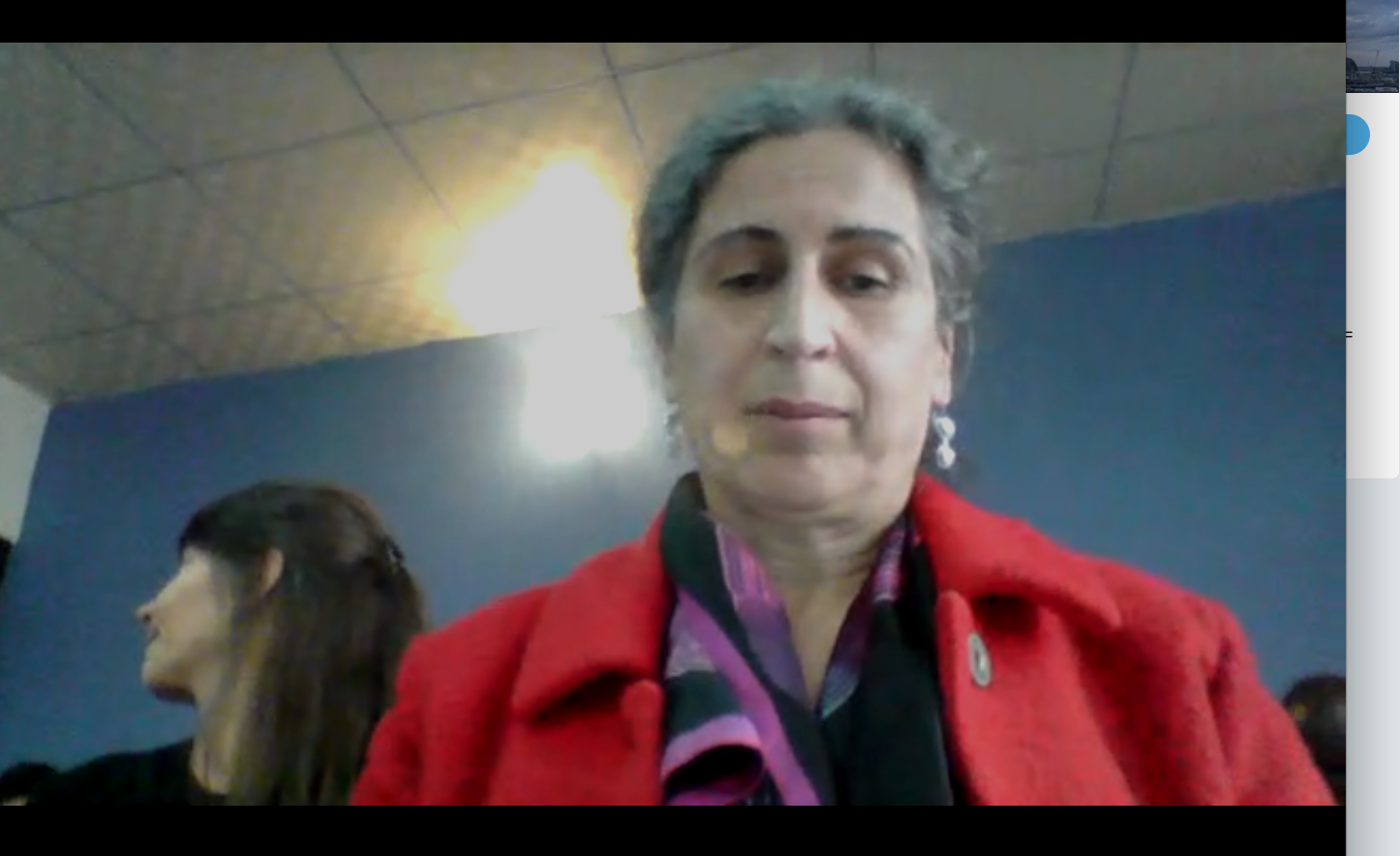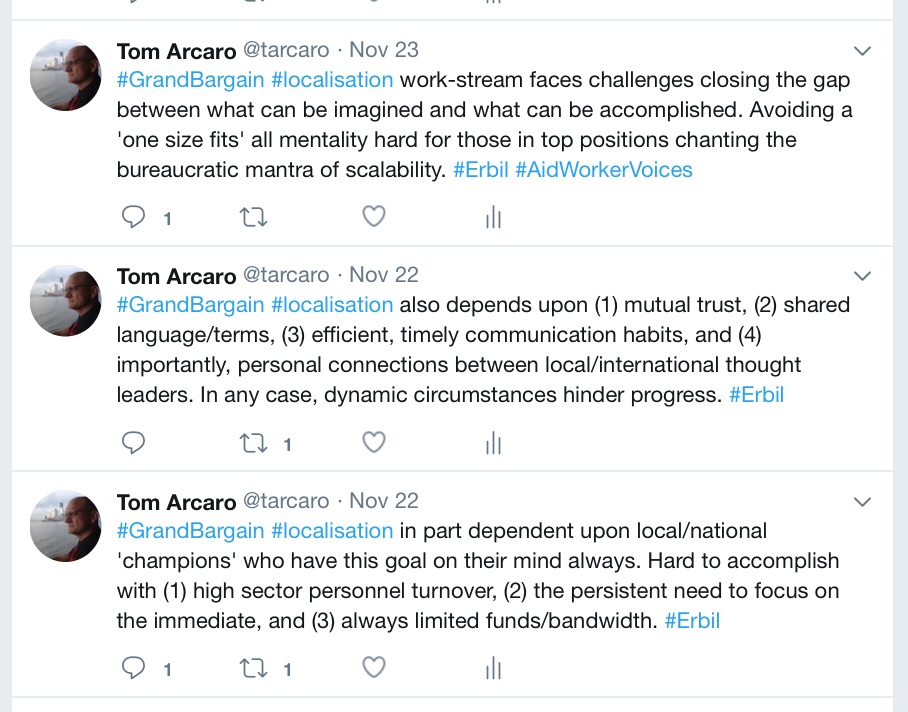Looking in as the Grand Bargain unfolds in Iraq
The setting
On November 22nd -Thanksgiving Day in the US- I was fortunate to be Skyped into the Grand Bargain Localization Workstream Demonstrator Country Field Mission final report session taking place at the NGO Coordination Committee for Iraq (NCCI) offices in Erbil, Iraq. I was invited to attend the meeting by Hero Anwar, Deputy Director of Rehabilitation, Education and Community Health (REACH), a LNGO in northern Iraq. I am working closely with Hero as part of my continuing research on national humanitarian workers. My interviews with her have been extraordinarily useful, as evidenced by my last post.
This is the second such Localization Workstream Demonstrator Country report, the first taking place in Bangladesh in September. There were approximately 40 people in the room, including the the nine member Mission Team which included donors, INGO representatives, and UN officials. Several NCCI members also Skyped in from Baghdad


I was about to add that who was not represented in the room were members of the affected communities, but that would have been an ignorant statement. All the Iraqis in the room are members of this group.
As preparation for listening in to this meeting, I read the Inter-Agency Standing Committee (ISAC) Mission Report Bangladesh Final. ISAC’s history, as described on their web site:
“The Inter-Agency Standing Committee (IASC) is a unique inter-agency forum for coordination, policy development and decision-making involving the key UN and non-UN humanitarian partners. The IASC was established in June 1992 in response to United Nations General Assembly Resolution 46/182 on the strengthening of humanitarian assistance. General Assembly Resolution 48/57 affirmed its role as the primary mechanism for inter-agency coordination of humanitarian assistance.”
The current ISAC goal is stated thusly:
“The multi-agency Mission was aimed at promoting and facilitating the achievement of the Localization Commitments through understanding what localization means for the various stakeholders, identifying good practices and barriers, and drawing up actionable recommendations for GB signatories and key stakeholders.”
‘Actionable recommendations.’ I’ll have to remember that phrase.
Thoughts listening to the report/discussions
Though the presentations and discussion lasted over three hours, I was only able to listen in to the first hour or so. Let me expand on the notes and conclusions that I wrote as I listened intently to the presentations and Q&A session. As a sector outsider/researcher my views are a wedding of insights I have gained from now several years of interviews and my basic understanding of the world as a sociologist. In terms of organizational and bureaucratic theory, I have found the German sociologist Max Weber to be very useful.

Champions
My first thought was ‘champions’ are needed, especially at the national level, for there to be meaningful and sustained movement toward the goals of ‘Localization.’
In US higher education we talk of ‘program champions’ or ‘initiative champions’, people who are consistent and even aggressive advocates, and whose personal passion for a particular program or project is always evident. She/he keeps these goals ever-present in their daily work flow. Success or failure of initiatives depend on having at least one or two people -champions- deeply committed to the cause.
And here’s the key. Real, lasting institutional change is about people and relationships, not organizational structure. In Iraq, Hero is -or could be- such a person because she both understands the ‘big picture’ but is also very good at the ‘people’ part of her job.

Identifying and then supporting champions is not always easy. First, the high turnover in the sector tends to make the nurturing, maturing, and mentoring of junior staff who are potential champions difficult. At the same time, those staff in senior positions may suffer from burnout and a persistent need to focus on the immediate problems within their own organizations. Intra-agency duties need constant attention, and any inter-agency activities, while they may be viewed as worthy and important, must always take second priority. The vast majority of LNGOs are resource poor and chronically underfunded. This leads to the common situation where there is no money to pay for any senior staff to take up ‘big picture’ leadership, and even if an individual has the will to do more and be the ‘champion’, this solution is not sustainable or effective in the long run. Asking donors for resources to cover these activities is difficult, and so one month leads to the next, with potential champions turning energies only toward accomplishing their own goals.
Communication
Assuming that one does emerge, moving forward as an effective champion for Grand Bargain ‘localization’ means working with other organizations such as NCCI. As I noted in a Tweet,
“#GrandBargain #localisation also depends upon (1) mutual trust, (2) shared language/terms, (3) efficient, timely communication habits, and (4) importantly, personal connections between local/international thought leaders. In any case, dynamic circumstances hinder progress.”
Trust is critical and only be developed, I’ll argue, by face to face interaction. Developing trust means having a common language and shared terms reinforced by effective, efficient, and mutually respectful communication habits made easy by seamless and user-friendly technologies and occasional face to face meetings. Here the issue of asymmetrical passion can arise. If one party senses the other is ‘dialing in’ their comments, input, etc., the relationship can falter. Champions need partner champions. Thought leaders on both sides of the relationship need to be committed, consistent, collaborative, and focused so that they can work together toward common goals and to address the inevitably changing local and international circumstances.
Each humanitarian response is unique
A basic truism of life is that there will be challenges closing the gap between what can be imagined and what can be accomplished, and such is the case for the promises made in the Grand Bargain. One pitfall is avoiding a ‘one size fits’ all mentality, hard for those in top positions chanting the bureaucratic mantra of scalability. Indeed, I think one of the most important skills that a leader must possess is to know when to (1) use proven templates (‘one size fits all’), or (2) when to retrofit template solutions based on local conditions, or (3) when to avoid templates and develop unique solutions based on local conditions.
One pitfall is avoiding a ‘one size fits’ all mentality, hard for those in top positions chanting the bureaucratic mantra of scalability. Indeed, I think one of the most important skills that a leader must possess is to know when to (1) use proven templates (‘one size fits all’), or (2) when to retrofit template solutions based on local conditions, or (3) when to avoid templates and develop unique solutions based on local conditions.
As the ISCA Localization Workstream Field Mission team moves forward, encouraging thought leaders -both national and international- to be adaptive in their approaches to problem solving seems a sound strategy.
Time and bandwidth
In a followup conversation with Hero she lamented that there are “…so many good reports and studies that we are sent, but sometimes it is hard to find the time to read them all.” If the ‘actionable recommendations’ are to be, well, actionable, there must be the time and energy available to take those actions by those in positions to do so. This takes funding, money for salaried time devoted to reaching Grand Bargain goals. People like Hero need to have their time freed so that they can use their expertise, social capital, and passion for helping their brothers and sisters to be champions.
And that’s one view from an outsider. Your feedback is welcome. Contact me here.


 Follow
Follow